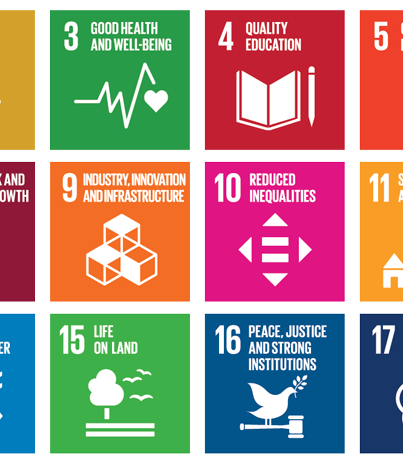-

 To develop quality education that promotes peace and sustainability
To develop quality education that promotes peace and sustainability

The Danish UNESCO-ASP (Associated Schools Project) network is part of the International UNESCO ASP Network, which presently includes 11,500 schools and educational institutions in 182 countries.
The Danish UNESCO ASP network contains of 37 schools: three primary, 14 primary & lower secondary, 18 upper secondary schools, one vocational training, and two teacher training Colleges. All together we called them Sustainable Development Goals Schools – in short UNESCO SDG Schools.
The practical work of the UNESCO SDG schools is based on UNESCO´s values, aiming at preparing and educating Danish youth for global citizenship and sustainable development – within a whole school approach.
On behalf of the Int. Office in the Danish Education Ministry, the network is coordinated by The Youth Town, located in Copenhagen. The Youth Town supports development of learning materials, offers pedagogical inspiration and innovation, coordinates conferences, network meetings, and study tours in collaboration with Danish and international partners.
Read more about the Youth Town here and on the international UNESCO network here.
Do you want your school to be part of the SDG School network? Contact us to hear more about your school’s opportunity.

Current UNESCO Projects
The Danish UNESCO network is devided into two main projects, Global Citizenship and Sustainable Development.
Global Citizenship
The project “Global Citizenship” has the purpose of strengthening the students in taking an active and responsible role, when facing and solving global challenges. Moreover, the network wishes to develop students’ ability to actively contribute to a more peaceful, tolerant, and inclusive world.
As a global citizen, you will feel connected to humanity and a larger community. There is an emphasis on political, economic, social, and cultural interdependence and connection between the local, the national, and the global level.
The education for global citizenship aims at the students develop the knowledge, skills, values, and beliefs that are necessary to be able to contribute to a more inclusive, justice, and peaceful world.
Education gives us an in-depth understanding that we are connected as citizens in a global community and that our challenges are interrelated.
Sustainable Development
The project “Sustainable Development” has the purpose of strengthening the students’ competences to make qualified sustainable decisions.
Sustainable development focuses on the balance between environmental, economic, and social development, which all are interdependent. Economic and social development must not occur at the expense of the environment, and vice-versa.
Therefore, the education in sustainable development aims to prevent, that today’s development is a threat to the current and future generations’ opportunities for getting their needs satisfied.
The Global Goals for Sustainable Development
The Danish UNESCO ASP network invites young students & their teachers from 8 different countries to be active participants in a Global Camp in Denmark – hosted by The Global Citizenship Network of Danish UNESCO SDG Schools.
Read more about it below

Your School and the SDGs
The UNESCO-ASP schools in Denmark are part of the international UNESCO strategy, focusing on UN’s Sustainable Development Goals.
UNESCO-ASP and SDG Schools
In September 2015, all UN nations agreed on the 17 Sustainable Development Goals at a UN general assembly. The aim of the goals is to encourage people to become more sustainable before the end of 2030.
The purpose of the SDG schools is to expand and integrate the SDGs through education. The themes of the education can for instance be human rights, global citizenship, intercultural competences, and sustainable development. All of these have their roots in previous projects by the Danish UNESCO network (read more about current projects above).
As a UNESCO SDG school, you are obligated to take part in UNESCO ASPs annual meeting, as well as being active participants in the pedagogical activities within one or two of the UNESCO Networks: Sustainable Development & Global Citizenship.
Read more about our activity plan below.
We hope that the students experienced that they are part of a larger community and that they can make a difference.
Your school can make a difference
Organizational Structure
Read about the organizational structure, the board, and its members.
The Board
A UNESCO ASP board has the overall responsibility for the Danish ASP-network.
The board is made up of:
- A chairperson, which is a member of the Danish UNESCO national commission.
- Two members, which are chosen by the Ministry of Education to represent the primary/lower secondary and upper secondary schools.
- A member, which is chosen between the members of the Danish UNESCO national commission or the special committee under the Danish UNESCO national commission.
Members of the board are chosen for a four-year period. They normally meet four times a year. The daily responsibility – leading, coordinating and administrating is taken care of by the national coordinator.
See the current board members and national coordinator below.
Board members
Mille Gabriel
Senior Researcher, curator, Ph.D.
The Danish National Commission
Morten Revsgaard Jensen
Consultant
Ministry of Education
Nanna Fiskaali
Consultant
Ministry of Education
Ungdomsbyen – Youth Town
Malene Rungvald Christensen

Contact Information
Find contact information on relevant members of the organization.
Address
Ungdomsbyen
c/o Global Platform
Faelledvej 12C, 3. sal
2200 Copenhagen N
Denmark
CVR: 30641426
Coordinator: Global Citizenship
Name: Gitte Rask Cannon
E-mail: gca@tradium.dk
Phone: +45 60 85 15 91
Coordinator: Sustainable Development
Name: Jon Urskov
E-mail: jp@egaa-gym.dk
Phone: +45 6133 4560



